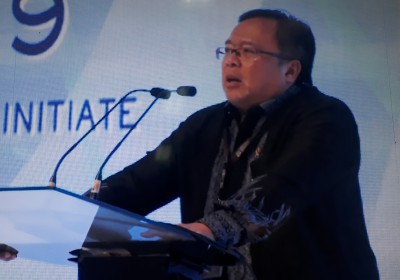Opinion Editorial of the National Planning and Development Minister, Bambang Brodjonegoro: Bottom-up Planning for Inclusive Development
October 09, 2019
Minister of National Development Planning Agency (Bappenas) Prof. Dr. Bambang P.S. Brodjonegoro
The Indonesian people have celebrated the 74th Independence Day. The theme was chosen this year “Excellent Human Resources will lead to Developed Indonesia" is in line with the improvement in the quality and competitiveness of Indonesia's Human Resources (HR) which is the focus of future development. We cannot just turn a blind eye to the importance of economic development for Indonesians, especially with the peak of the demographic dividend that is coming our way. In the next three to four years, our country will begin to enjoy the peak of demographic dividend with the number of young labor force far leading in the population structure.
We are proud to see that more and more young Indonesians have shown interest to actively participate in development. Currently, CEOs of high-tech companies that are worth millions, or even billions of dollars are millennials who will continue to push Indonesia to enter the global business arena. We witness the increasing interest of young people in the entrepreneurial domain as we see many startups being developed. The establishment of these businesses was inspired by the objective to find solutions to social-economic problems in society.
An example is Aruna Indonesia, which was one of the speakers at the 2019 Indonesia Development Forum (IDF) on July 22-23. It is a startup that was built to break the chain of middlemen in the fishing industry and bring prosperity to Indonesian fishermen. As a maritime country, fishery sector should be the backbone of Indonesia. And the fact that young people in their early twenties are already motivated to actively contribute to the development of this sector is very encouraging.
However, despite the need to excel in this highly competitive environment, we must admit that our workforce is still dominated by graduates of primary schools, which makes up 24 percent of the total workforce. They are not equipped with adequate skills to catch up with the rapid development in the industry. In fact, they will be the first to be eliminated from this highly intense competition which marks this fast-everything-era we currently live in.
Although in May 2019 the Central Statistics Agency (BPS) reported that the Human Development Index (HDI) in terms of knowledge shown by the expected school participation rate and the average actual participation rate continued to improve, this does not automatically translate into a significant improvement in the workforce participation rate. Vocational education which is expected to accelerate the increase of labor force participation has yet to show the expected result because the link and match between education and workforce have not been properly developed. Structural reform and curriculum improvement in vocational education became one of the main topics of discussion at the 2019 IDF, which adopted the theme "Mission Possible: Seizing the Opportunities of Future Work to Drive Inclusive Growth.”
Recommendations on Manpower Management
Developing a road map for Indonesian manpower is one of the outputs Bappenas wanted to achieve from IDF 2019. The forum involved more than 245 national and international speakers and more than 2,900 participants, of whom 80 were persons with disabilities.
Since its inception in 2017, the IDF has been designed as a platform for developing sustainable and inclusive development policies in Indonesia, involving ideas from grassroots, academics, development partners and other development enthusiasts. This year, four pillars of policy recommendations related to employment have been created from 41 discussion sessions that have taken place very productively over the two days of the forum.
The four policy recommendations include, first, encouraging the formation and growth of new businesses. Second, the modernization of household businesses and Micro and Small and Medium Enterprises (MSMEs) to be globally competitive. Third, promote inclusive employment policies. Fourth, prepare the future workforce with expertise. These recommendations were not without basis but rather departed from the experience and knowledge of development actors. Several good practices related to the recommendation points have also been or are being implemented by various parties.
Along with these recommendations, future development needs to be directed to harmonize programs that can support the creation of competitive human resources, invite productive investment to open employment and take advantage of digital and creative economic breakthroughs to accelerate economic growth. Also, there need to be robust regulations that support the absorption of inclusive labor.
The industrial sector needs to be encouraged to provide opportunities, facilities and types of jobs for vulnerable groups. Stigma-free social norms also need to be developed to support vulnerable groups. To do these recommendations, cooperation between the government, the private sector, educational institutions, trade unions, civil society, and development partners needs to be established.
Various ideas and good practices presented in IDF 2019 will inform the development of the National Medium Term Development Plan (RPJMN). This way the job creation strategy in the RPJMN can be more participatory, taking into account the current conditions that we face.
The brainstorming process in IDF 2019 can also encourage further collaboration in future development planning, both at the local and national level. The involvement of various development actors, including millennial generation and vulnerable groups, will ensure the development of plans according to the needs to achieve inclusive development goals.
Minister of National Development Planning Agency (Bappenas)
Prof. Dr. Bambang P.S. Brodjonegoro
Indonesia’s Research Institutions Supporting the Development of the Electric Vehicle Industry
Indonesian Muslim Fashion and Cosmetics IKMs Shine at Dubai World Expo 2020
Govt Steps Up UMKM Transformation Efforts in the Midst of Pandemic Slowdown
Govt Encourages Promotion of IKM Products in Digital Era
Government Begins Developing Maritime Training Center in Makassar
Tweets by IDDevForum
